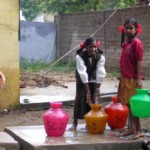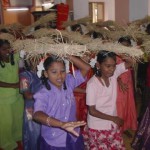India: TELC Bethania Deaconess House
TELC Bethania Deaconess work is part of the Tamil Evangelical Lutheran Church (TELC). The membership of TELC is predominantly Dalit and Adivasi. TELC is one of the oldest Protestant Churches and one of the largest Lutheran Churches in India. Its ministry is mainly concentrated in the state of Tamilnadu and in certain parts of Karnataka, Andhra Pradesh, Kerala, Pondichery and Andaman & Nicobar Islands. Its headquarters is situated in Trichy district, Tamilnadu. Though TELC was established on January 14, 1919 as a registered body its history can be traced way back to the Tranquebar Mission on July 9, 1706 when Bartholomaeus Ziegenbalg and Heinrich Plutschau entered Tranquebar to spread the Gospel. After the death of Ziegenbalg, missionary work was revived only in 1841 by the Leipzig Evangelical Lutheran Mission (LELM), Germany. It was in 1950 under an arrangement called “Document B”, mission work which hither to was taken care by both the German and Swedish Mission Societies were handed over to TELC with an understanding that these foreign missionary societies continue to be partners in mission for promoting the welfare and growth of TELC. Today TELC has 1,05,773 members in around 110 pastorates. Apart from the number of educational institutions, hospitals and orphanages the Church also concentrates on social work activities such as Emergency Relief Operation, Self-Employment Project, Community Economic Programme, Local Resource Generation Project, Ecological Programme, Addiction Concern Programme and Tribal Welfare Project.
The work of the TELC deaconesses is mainly based in four states in India – Tamil Nadu, Kerala, Karnataka, and Pondicherry.
Head office – TELC Bethania Deaconess House contact details
TELC Bethania Home (part of the Kaiserwerther General Conference)
1084, Mission Church Road, Thanjavur (*formerly Tanjore), 613001, India
Contact: bethaniahome@yahoo.co.uk, Phone: 04362 236092.
Stanley Kiruba, stanleykir@gmail.com
25/26 VATCHALAPURAM 5TH STREET
THIRUNINRAVUR
CHENNAI, TAMIL NADU 602024, INDIA.
+ 91 8148675248
Leadership in TELC Bethania
The Deaconess Board provides management for the work of deaconesses. The head is called Deaconess Mother. In October 2011 Sr. Grace Padma was inaugurated as new leading sister of the community. She succeeded Sr. Emily Shanta on her retirement.
Phone: 9751072801.
TELC Bethania Membership
TELC Deaconesses are those who have taken vows to remain unmarried. These women are given training and qualifications and are allowed to reside and work in and around Thanjavur. They have build a great community centre in Thanjavur for Deaconesses. The deaconess are provided with a uniform of a white sari and white cap. They are known as ‘sisters’. The TELC owns a great community campus that comprises of the Deaconess Home, Bethania Home for Women, and Nazareth Home for Children.
Focus of diaconal ministry
The deaconess are involved both in church work and in social activities. TELC deaconess works for the welfare of physically challenged women and children, widowed poor women, mentally challenged and abandoned women, and orphans. Deaconesses, with the help of some volunteers, includes teaching tailoring, production of handmade crafts, preparation of bread and wine for Holy Communion, and small scale industrial training with the disadvantaged women and children.
Education is given a priority, especially because India has the dubious distinction of the largest number of child labourers in the world. The economically backward families are hardly able to feed their children and, hence they are forced to send them as child labourers in agricultural lands and industrial establishments. Lack of compulsory primary education and faulty educational Systems are the other factors that contribute to the swelling of the ranks of child labourers. TELC tries to tackle the problem by providing the children and youth with shelter, food and education. With support from sponsors, it is possible to reach the poorest of the poor families living in villages and slums to give them quality education. The children receive education, and enjoy good health and become self confident, self reliant and develop responsibility. Children are admitted from all communities without discrimination based on caste, creed and religion.
Institutions in which deaconesses provided service include:
The Mayiladuthurai Children’s Home, which provides accommodation and education for about 250 girls.
The TELC Frolich Home for children and young people, which provides food, shelter and education.
TELC Frolich Home 20903 (Girls), Pandur Post (via) Kadambathur, Tiruvallur District, Tamil Nadu, South India.
Partners
The Evangelical (Ev.) Lutheran Missionwork (Germany) send volunteers to work with TELC, usually for a period of six months. In 2013-14, these include:
Lea Buchholz, based at the Home for Children/Girls, TELC, providing education support for girls in free time, in Mayiladuthurai
Sophie Fijal, Bethania Deaconess Home, TELC, care of women with mental and physical disabilities; Thanjavur
Bengt Rohde (in partnership with the Ecumenical Foundation) Frohlich Home for Children, TELC, taking care of boys and administrative tasks, based in Pandur (Tiruvallur)
Katharina Thoden, Home for Children/Girls, TELC, free time educational support for children, especially girls, in Mayiladuthurai
Sarah Werner, Bethania Deaconess Home, TELC, free time educational support for children in kindergarten, Nazareth; Thanjavur
History

“The Leipzig missionary, Sister von Loden, with the older girls of the boarding school, Tanjore.” (Source: Basel Mission archives)
Other information to be collected includes (but is not limited to) the following questions.
A brief history (may include links to documents and websites) – how did the work of TELC deaconesses get started? What are the key dates and events? Are there documents that are part of the history (please specify)?
Diaconal ministry agents: consecretrated/commissioned/ordained/other?
Historical information and dates re formation/recognition of diaconal ministry agents in the denomination/church agency.
Are deaconesses remunerated? Do they live in community (eg motherhouse) or independently? Etc.
What kind of training/formation do diaconal ministry agents receive before formal recognition in their church. Are there expectations of ongoing training, or professional development? If yes, what is expected and how often does it happen?
How many diaconal ministry agents are there currently in the denomination or church agency? Any comment on trends in numbers?
Are there key people (historical or current) in the organization who have provided significant leadership. Any weblinks to their story, or a short write up?
Who are the current leaders in the diaconal association? (photos, ‘blurb’).
An overview of main responsibilities for diaconal ministry agents (past and present). Are they located within a church, a particular facility or agency, or community based? Are diaconal ministry agents appointed to individual placements or work together on projects or in institutions?
Are diaconal ministry agents able to preside at sacraments (communion, baptism, weddings etc)?
Who makes the appointments for diaconal ministry agents eg they apply for positions, they are appointed (eg by a Bishop, by the conference office, or another body/committee).
Is there a length of time for appointments to a particular place, and who makes the appointment eg Bishop? (eg usually less than 5 years, usually between 5 and 10 years, at the discretion of the diaconal ministry agent or at the discretion of the appointing body), appointed to and remain with a particular mother house, etc.
Do diaconal ministry agents organize conferences, seminars, gatherings for professional development, pastoral peer support etc? How often and what is the nature of these events?
Key issues and challenges in the contemporary ministry context
Do the diaconal ministry agents have ‘code of conduct’ or ‘code of ethics’ that inform ethical and behavioral expectations for ministry?
Key documents (historical, vision and mission etc) – links or PDF or Word files
Photos
Links to relevant articles, websites etc
Other areas of interest……
(information to Rev Sandy Boyce, President, DIAKONIA World Federation, sandyeboyce@gmail.com, to upload to this website)


